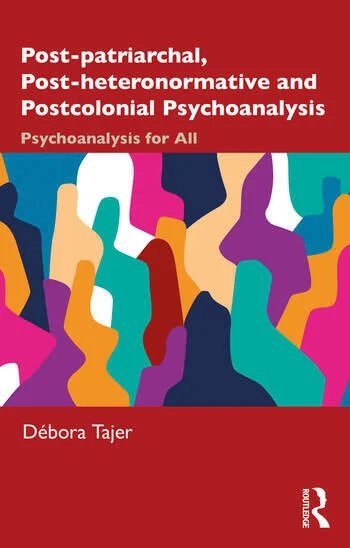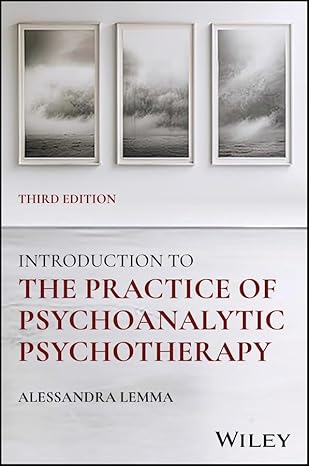Post-patriarchal, Post-heteronormative and Postcolonial Psychoanalysis: Psychoanalysis for All

Book Details
- Publisher : Routledge
- Published : December 2024
- Cover : Paperback
- Pages : 130
- Category :
Psychoanalysis - Catalogue No : 97910
- ISBN 13 : 9781032532790
- ISBN 10 : 1032532793
There are currently no reviews
Be the first to review
Post-patriarchal, Post-heteronormative and Postcolonial Psychoanalysis considers contemporary efforts to create a post-patriarchal, post-heteronormative and postcolonial psychoanalytic approach to human suffering.
Débora Tajer examines contemporary psychoanalysis and its future by integrating three key strands of Argentinean cultural discourse: the popularity of psychoanalysis, the active feminist movement, and the burgeoning field of feminist psychoanalysis. Tajer delves into themes of subjectivity, power, gender, and family, revealing the patriarchal, heteronormative, and colonial underpinnings of classical psychoanalytical approaches. She also explores the contributions of theoretical-clinical instruments from a gender and psychoanalytical perspective. Throughout the book, Tajer highlights changes in femininities and masculinities, new family and relationship configurations, current forms of labour insertion, evolving ideals, and new modes of gender identity assumption and sexual expression.
Post-patriarchal, Post-heteronormative and Postcolonial Psychoanalysis will be of great interest to psychoanalysts in practice and in training. It will also appeal to readers looking to understand Argentinian perspectives on the future of psychoanalysis.
Reviews and Endorsements
I wholeheartedly endorse this book. Necessary because psychoanalysis must reconsider whether the categories it has used to understand gender and sexuality still account for the subjectivities of our century, Psychoanalysis for All is a vital contribution. Many conceptual tools that could have been revolutionary have become conservative and normative. Not to mention the fact that psychoanalysis has carried a normative bias since its inception. That's why Débora Tajer proposes a psychoanalysis that is both post-patriarchal, post-heteronormative, and post-colonial. Affiliated with a powerful and creative Argentine tradition of articulating psychoanalysis and feminism, Professor Tajer offers new theoretical and clinical elements for a psychoanalysis that addresses the challenges and difficulties of our time.
Jorge Reitter, author of Heteronormativity and Psychoanalysis: Oedipus Gay
Psychoanalysis for All is a courageous book. Debora Tajer criticizes conservative aspects of psychoanalysis based on colonial, patriarchal and heteronormative bases, without, however, renouncing her passion for this theoretical-clinical work and its transformative power. The experience of a psychoanalytic practice with a gender perspective allows us to face changes in bonds, ideals, identities, sexual practices, work and politics. It is a book that invites young analysts to continue to believe in transformation through words and for experienced analysts to remember to always live up to the subjectivity of their time.
Patricia Porchat, Psychoanalyst. Professor at the State University of São Paulo
This original and timely book lucidly demonstrates how psychoanalysis, as well as contributing to colonial and patriarchal gendered oppression, is vital to undoing the psychic damage this does. Through meticulous clinical and conceptual analysis, Debora Tajer persuasively shows what postcolonial, feminist and trans-supportive psychoanalytic practice looks like, as grounded in and engaging with local material-political conditions and practices. This vital contribution revises what therapeutic work should and can be. It should be read by all who counsellors and psychotherapists.
Erica Burman, Group Analyst and Professor of Education, University of Manchester
Debora Tajer’s book brings to an English-speaking readership important contributions to psychoanalysis of the Argentine School of Psychoanalysis and Gender. She explores the marks of patriarchy, heteronormativity, and coloniality within traditional psychoanalytic theory and clinical process and develops a gender-conscious psychoanalytic interpretation of contemporary gender roles, sexualities, and family forms. Tajer shows how Argentine psychoanalysis has been impacted by militant political struggles for gender equality in her country, and illustrates the relationship between subjectivity and power in the work of two prominent Argentine psychoanalysts, Silvia Bleichmar and Gilou García Reynoso.
Nancy Caro Hollander, Ph.D. Research Psychoanalyst. Member, Psychoanalytic Institute of Northern California. Faculty, NYU Post-Doctoral Program in Psychotherapy and Psychoanalysis. Professor Emerita of History, California State University
In this excellent book, Post-patriarchal, Post-heteronormative and Postcolonial Psychoanalysis: Psychoanalysis for All, Debora Tajer offers a deep dive into theoretical and clinical issues from a psychoanalytic and gender perspective. The implications for our understanding of changing femininities and masculinities, new family and relationship configurations and changes in sexualities and gender identities are explored. It considers socio-historical changes, particularly since the fourth wave of feminist empowerment in the last decade. This book is important for the psychoanalytic clinician entering contemporary clinical scenarios. It will be an enrichment for readers interested in this crucial topic.
Patricia Alkolombre, Ph.D. Chair of Women and Psychoanalysis Committee, International Psychoanalytic Association, COWAP IPA President
In this remarkable book, Débora Tajer introduces her thoughts on gender and diversity, changes in family organization, trans-infancy as well as in the feminine condition and masculinity. Beyond traditional thinking, the author focuses on a clinical perspective facing the need to make transformations of the psychoanalytical approach to those changes. On this journey she proposes that contemporary psychoanalysis should be able to understand diverse subjectivities in order to contribute to a better theoretic-clinical comprehension of those that do not correspond to heterosexual and patriarchal norms. I highly recommend this book to psychoanalysts and other readers interested in this topic.
Leticia Glocer Fiorini, Current chair of the “Sexual and Gender Diversity Studies Committee” of the International Psychoanalytic Association (IPA). Former President of the Argentine Psychoanalytical Association
Table of Contents
About the English Version
Introduction
1. Gender and Subjectivation: Ways of Living, Loving, and Working
2. The Modern Family Model: Contemporary Alternatives and New Challenges
3. Diversity and Gender in Psychoanalytic Theory and Clinical Practise
4. Trans Childhoods as Possible Childhoods
5. What Does a Man Want? Toward the Clinical Treatment of Men from a Gender Perspective
6. Amphibians: Sexuality and Love in Contemporary Women and the Attendant Clinical Challenges
7. Conceptualising the Relationship between Subjectivity, Power, Psychoanalysis, and Gender
8. Power Relations in Clinical Practice
9. Psychoanalysis Alone Is Not Enough, But We Can’t Do Without It...
About the Author(s)
Débora Tajer is a psychoanalyst based in Buenos Aires, Argentina. She is Professor of Public Health and Gender Studies at the University of Buenos Aires.
Customer Reviews
Our customers have not yet reviewed this title. Be the first add your own review for this title.
You may also like
Unconscious Politics: Alienation, Social Science and Psychoanalysis
R.D. Hinshelwood
Price £26.09
save £2.90
Introduction to the Practice of Psychoanalytic Psychotherapy: 3rd Edition
Alessandra Lemma
Price £36.85
save £4.10
The Hardest Passage: A Psychoanalyst Accompanies Her Patient’s Journey into...
Maxine Anderson
Price £17.09
save £1.90







